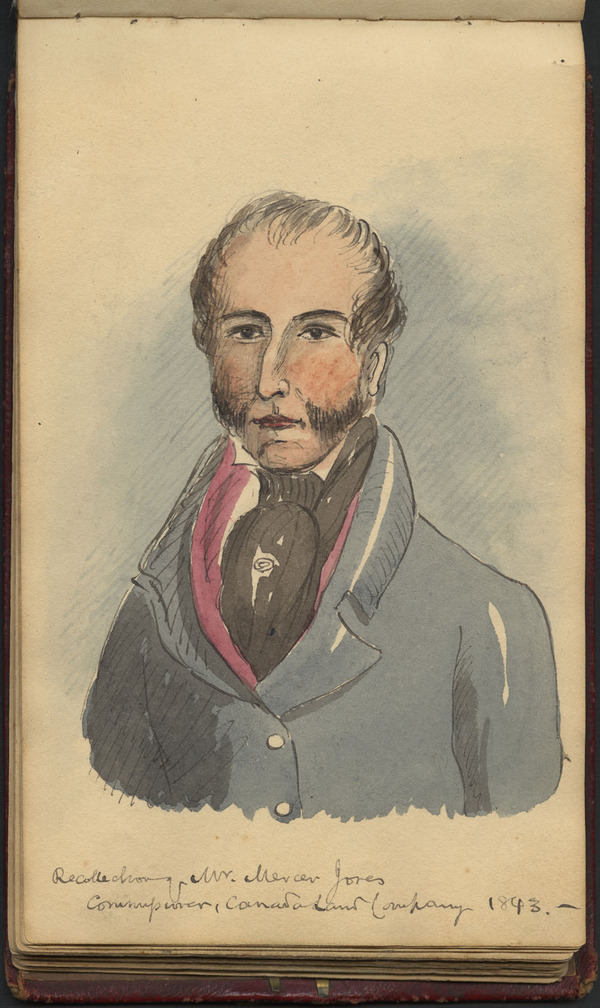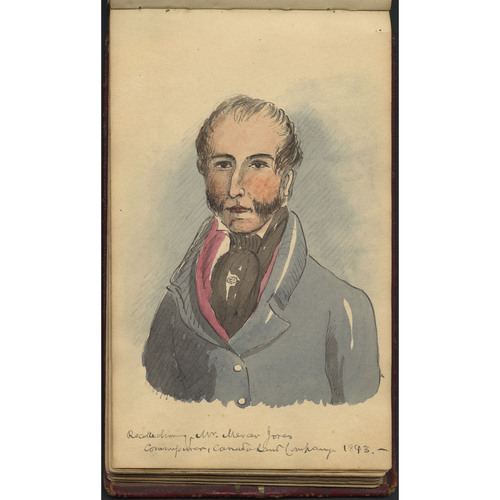JONES, THOMAS MERCER, Canada Company official and banker; b. in England in 1795; d. 2 Oct. 1868 in Toronto, Ont.
In 1815 Thomas Mercer Jones commenced an apprenticeship with the London mercantile firm of Ellice, Kinnear, and Company. With the help of his mentor in the firm, Edward Ellice, Jones rose to a position of responsibility and gained the reputation of being “steady to a proverb.” Ellice was also deputy governor of the Canada Company, the huge land and colonization venture chartered in 1826. It was intended that the Canada Company be granted the crown reserves and a large portion of the clergy reserves in Upper Canada in return for an annual payment to the government of Upper Canada which in effect would release the provincial executive from financial dependence on the elected assembly. The clergy reserves were excluded from the plan because of the objections of John Strachan, Church of England archdeacon and later bishop of Toronto, and the Upper Canada Clergy Corporation, but in their place the company was granted the Huron Tract, a 1,000,000-acre triangle bordering on Lake Huron. The company, whose court of directors was based in London, commenced its operations in Canada under the superintendence of the Scottish novelist John Galt* in 1827, but his poverty of business experience caused confusion in the company’s affairs. When the directors determined to replace Galt by two commissioners in 1829, Jones was offered, through Ellice’s influence, a co-commissionership along with William Allan*, the financial pillar of the Family Compact in Upper Canada.
Jones arrived in Upper Canada in early 1829. Originally his contract was for one year, but the directors were so impressed with the regularity in the accounts and the increased sales he and Allan soon established that they persuaded him to stay on. Allan managed the sale of the scattered crown reserves, while Jones administered the settlement of the Huron Tract. He carried out his duties from Toronto, where in 1832 he married Elizabeth Mary, daughter of John Strachan.
Jones soon became convinced that the company’s future depended mainly on the Huron Tract, and with the grudging approval of the directors undertook in the mid 1830s a number of projects to promote and improve the area. He operated a company-owned steamship, but the vessel was frequently locked up by Goderich’s silty harbour bar. Costly efforts to improve the harbour failed, as did extensive ventures in lumbering in the tract. Moreover, the times were not ripe for ambitious improvements since the number of immigrants who settled in the Huron Tract was adversely affected by recurrent cholera epidemics, slightly improved economic conditions in Britain, and uneasiness in Upper Canadian politics.
By the late 1830s Jones was effectively lord and master of the Huron Tract. He moved from Toronto and lived in a lavish mansion in Goderich overlooking Lake Huron. His conservative social and economic standing had brought him in 1833 into William Lyon Mackenzie’s celebrated list of Family Compact members. Opposition to his rule and to the considerable swagger of the Canada Company was forming, however, both in the province and in London. The company and its commissioners were vehemently opposed by Reformers in the assembly who objected to its monopolistic rights and practices and its close alliance with the Family Compact. Damaging criticism also came from a local group, the “Colborne Clique,” made up of educated and wealthy landowners who had bought large portions of company land in Colborne Township north of Goderich and resented the power over local affairs exercised by the Canada Company. The Colbornites demanded a bridge across the Maitland River to give proper access to their property but Jones, for the company, was reluctant to make the expenditure in an area which had been almost entirely sold off. A newspaper feud and mounting public pressures forced the establishment in 1840 of a provincial commission to investigate the company’s affairs. The commission prepared only a preliminary report which, although identifying certain misdemeanors, largely cleared the company of any charges that it had grossly violated its charter. This verdict was due in part to the untiring efforts of Frederick Widder, a new Canada Company commissioner sent out from England in 1839 as an eventual replacement for the aging William Allan. An enterprising and responsible officer, Widder by 1841 had taken sole command of the Toronto office.
Jones’ stock was still high with the London court of directors but in the 1840s he began to dabble openly in local politics, a policy the directors had always expressly forbidden. In the 1841 provincial election the Reform candidate in Huron County was a former Canada Company employee turned staunch supporter of the Colborne Clique, the eccentric William “Tiger” Dunlop*. In opposition to him Jones first nominated John Longworth, the company’s unpopular chief engineer, and then James McGill Strachan, his brother-in-law and legal counsel to the Canada Company. A violent campaign followed and Strachan was elected with a plurality of ten votes. Dunlop’s supporters petitioned for an inquiry, however, which proved Strachan’s support was based on unpropertied voters, and Dunlop was declared elected. The London directors cautioned Jones against further political manoeuvrings.
Jones also came into conflict with the Colbornites in the early 1840s over local control of the government. Governor Sydenham [Thomson*]’s municipal reforms of 1841 created a system of district governments in which elected local officials had the power to impose taxes and administer local public institutions. The Colborne Clique, dominating the Huron District Council, attempted in 1842 to tax the Canada Company’s wild lands. Jones and the company fought this move in the courts and a compromise was not achieved until 1846.
In these years competition between the two commissioners was developing. Widder was actively soliciting the support of the directors; Jones, forced to deal with day-to-day complaints of settlers in the field, could not match his rival’s grandiose schemes, though in 1844 Jones’ father-in-law, Bishop Strachan, wrote to the directors lavishing praise on Jones’ efforts. Then, when Widder made an offer for the company to take over the administration of the clergy reserves, Strachan, under the pseudonym Aliquis, published in 1845 a series of open letters condemning Widder and his system of leasing company lands. Jones was mortified and denied, it would seem quite honestly, any prior knowledge of the letters. By 1850 Jones was clearly the junior of the two commissioners and Goderich a mere branch of the Toronto office.
Jones’ interests gradually became solely the interests of the Huron area and Goderich. He had served as an officer of the Huron County militia in the late 1830s and was warden of the district in the mid 1840s. Indeed, his activities became perfectly complementary to the views of the Colbornites. Together they perceived that unless a railway could return Goderich to prominence, it would be overshadowed by growing towns such as Stratford and Guelph to the east. The Colborne Clique in 1852 supported construction of the Buffalo, Brantford, and Goderich Railway from Buffalo to a terminus at Goderich which would become a major port funnelling the trade of lakes Huron and Michigan to upstate New York. Widder and the court of directors supported the rival Toronto and Guelph Railway, to run through Guelph and Stratford and eventually to Sarnia, which they considered the best port on Lake Huron; Goderich would then simply terminate a branch line from Stratford. To the directors’ amazement, Jones announced company support for the Buffalo-Goderich route. In late 1852 he was dismissed. The company, mindful of his earlier services, granted him a sizable pension of £400 per annum.
Jones had gained much sympathy in Huron County. Remaining in Goderich, he was agent for the Bank of Montreal from 1852 until his wife’s death in 1857, when he moved to Toronto. There he lived in retirement until his death in 1868. Two sons, Charles Mercer Jones and Strachan Graham Jones, survived him.
[The primary source for materials relating to Thomas Mercer Jones is the Canada Company’s records at PAO. Since Jones’ responsibility in the company’s operations was so great, he figures prominently in almost all the Canadian records from the time of his appointment in 1829 until his dismissal in 1852. Of particular value in this study were: Proceedings of the general courts, 1 (1826–54); Minutes of the Court of Directors, 2–6 (1826–54); Minutes of the committees, 2–7 (1826–69); Commissioners’ letters and reports, 1–2 (1826–34); Correspondence from the commissioners (originals), 1830–37; Letters to Court of Directors from Frederick Widder, 1–3 (1839–45, 1852, 1853–59); Correspondence to the commissioners, 2–5 (1834–77); “Miscellaneous Correspondence, Canadian Office”; and Annual report (London), 1824–70. r.d.h.]
National Library of Scotland (Edinburgh), Edward Ellice papers. PAO, Misc., 1840, Daniel Lizars, “Report, upon the affairs and influence of the Canada Company . . .” (Toronto, 14 Jan. 1840); Misc., 1840, J. T. W. Jones to Sir George Arthur, “Preliminary and confidential report of an enquiry into the affairs of the Canada Company” (2 Nov. 1840); Strachan (John) papers. Aliquis [John Strachan], Observations on the history and recent proceedings of the Canada Company; addressed in four letters to Frederick Widder, esq., one of the commissioners (Hamilton, [Ont.], 1845). H. I. Cowan, British emigration to British North America; the first hundred years (Toronto, 1961). Gates, Land policies of U.C. R. D. Hall, “The Canada Company, 1826–1843” (unpublished phd thesis, Cambridge University, 1973). H. J. M. Johnston, “Transportation and the development of the eastern section of the Huron Tract, 1828–1858” (unpublished ma thesis, University of Western Ontario, London, 1965). C. G. Karr, The Canada Land Company: the early years, an experiment in colonization, 1823–1843 (Ottawa, 1974). R. C. Lee, “The Canada Company, 1826–1853; a study in direction” (unpublished ma thesis, University of Guelph, Guelph, Ont., 1967). Norman Macdonald, Canada: immigration and colonization, 1841–1903 (Toronto, 1966). Wilson, Clergy reserves of U.C. H. J. M. Johnston, “Stratford and Goderich in the days of the Canada Company,” OH, LXIII (1971), 71–85. G. C. Patterson, “Land settlement in Upper Canada, 1783–1840,” Ont., Dept. of Archives, Report (Toronto), 1920.
Cite This Article
Roger D. Hall, “JONES, THOMAS MERCER,” in Dictionary of Canadian Biography, vol. 9, University of Toronto/Université Laval, 2003–, accessed December 27, 2025, https://www.biographi.ca/en/bio/jones_thomas_mercer_9E.html.
The citation above shows the format for footnotes and endnotes according to the Chicago manual of style (16th edition). Information to be used in other citation formats:
| Permalink: | https://www.biographi.ca/en/bio/jones_thomas_mercer_9E.html |
| Author of Article: | Roger D. Hall |
| Title of Article: | JONES, THOMAS MERCER |
| Publication Name: | Dictionary of Canadian Biography, vol. 9 |
| Publisher: | University of Toronto/Université Laval |
| Year of publication: | 1976 |
| Year of revision: | 1976 |
| Access Date: | December 27, 2025 |




